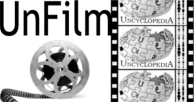Trilogy
“It’s a trilogy!”
– Lorde on The Ring
A trilogy is something made up of three different things. It's mostly used in film, literature and trigonometry. In film, trilogies have no real meaning whatsoever, since there is no proven evidence that a film series made up of three movies is more special in any way than, for example, Saw (which as of 2021 contains nine movies) or Kill Bill (made up of two movies). In literature, the most famous trilogy is arguably Uncyclopedia's Waiting for Godot trilogy. In trigonometry, there are no famous trilogies, as triangles rarely achieve a celebrity status.
Musicians sometimes refer to their works as trilogies, but it's mostly as a joke or in a way that is not very sexy or meaningful. For example, Alice in Chains' third LP is commonly known as "tripod", and the cover has a three-legged dog on it. Nevertheless, trilogies are considered somewhat sacred among popular culture fans, and fans usually treat film trilogies, such as Back to the Future and nothing else really, with more respect than other works.
History[edit | edit source]
Art[edit | edit source]
The Bible was actually created as a trilogy, the first section basically telling all about the background of how Israelis received ten commandments.[1] The second one is a bunch of books written by a bunch of oracles.[2] The third one is everything else in Hebrew written ever since while being stoned, plus everything by Lou Reed and Larry David.
Since film was created by the porn industry, Nazis and Charlie Chaplin, there were many great works which were forced to become trilogies, or even centipedes, mostly by greedy film studios. Such films include The Fly by David Cronenberg, Iron Man, practically everything else with the word "man"[3] attached to it, The Matrix, and many, MANY, many more.
Some trilogies were created as trilogies of trilogies. Those are the worse because they are not really trilogies, they are more like matrices. And we already have more than three film matrices. Give it a rest, Lucas.
There are no TV trilogies known to science, except the Seinfeld–Frasier–Becker trilogy, and some stuff on South Park.
The only good trilogies are the ones that are not chronological, meaning that 1 can be watched after 2 and 3, 2 can be watched after 3, and 3 can be remade to set the ground for 4—which is awesome.
People[edit | edit source]
Some people, mostly women, choose or are forced by society to become trilogies themselves, such as Debra Morgan Morgan, Julia Louis Dreyfus, Sacha Baron Cohen, and the guy who appears in My Left Foot, There Will Be Blood and this article.
How to name your film trilogy[edit | edit source]
Much like naming a TV episode, naming trilogies has become a burden over the course of history, and trilogies are very rarely named anymore. No one really cares what an episode or a trilogy is called. Some TV shows are naming their seasons, which is far more logical. This way, no one cares about which season is it, and the show becomes more interesting, unless it's Survivor: Holocaust or Paraguay Samurai Warrior or some shit.
Since the only good part of a trilogy is—almost always—the first part, trilogies are often confused with monologies. Equilateral trilogies (the ones in which all three movies are of the same quality) are similar, not congruent. The Pythagorean theorem claims that the nerdiness of the longest part of a trilogy is equal to the sum of the nerdinesses of the other two parts. But that's just nerd-bashing Mother Fockers.
References[edit | edit source]
- ↑ And the commandments themselves, also written by Moses. It's like his diary or something.
- ↑ That part contains Psalms, which is David's diary. It has been poorly adapted into The New Testament, which is Jesus's diary, and later into Mel Gibson's diary, Apocalypto. That trilogy ignores parts 2 and 3 of the original trilogy, because they belong to a different timeline.
- ↑ But not "woman".
